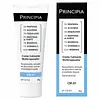What's inside
What's inside
 Key Ingredients
Key Ingredients

 Benefits
Benefits

 Concerns
Concerns

No concerns
 Ingredients Side-by-side
Ingredients Side-by-side

Ethylene Brassylate
MaskingCyclopentasiloxane
EmollientTocopheryl Acetate
AntioxidantBHT
AntioxidantPolymethylsilsesquioxane
Disodium EDTA
Glycerin
HumectantCaprylyl Glycol
EmollientCaprylhydroxamic Acid
Propylheptyl Caprylate
EmollientSorbitan Olivate
EmulsifyingCetearyl Olivate
Hydroxymethoxyphenyl Decanone
Skin ConditioningBisabolol
Masking4-T-Butylcyclohexanol
MaskingPentylene Glycol
Skin ConditioningEthylhexyl Olivate
Skin ConditioningLecithin
EmollientSodium Acrylates Copolymer
Water
Skin ConditioningEthylene Brassylate, Cyclopentasiloxane, Tocopheryl Acetate, BHT, Polymethylsilsesquioxane, Disodium EDTA, Glycerin, Caprylyl Glycol, Caprylhydroxamic Acid, Propylheptyl Caprylate, Sorbitan Olivate, Cetearyl Olivate, Hydroxymethoxyphenyl Decanone, Bisabolol, 4-T-Butylcyclohexanol, Pentylene Glycol, Ethylhexyl Olivate, Lecithin, Sodium Acrylates Copolymer, Water
Water
Skin ConditioningSodium Gluconate
Skin ConditioningPolyacrylate Crosspolymer-6
Emulsion StabilisingGlycerin
HumectantCetearyl Olivate
Sorbitan Olivate
EmulsifyingGlyceryl Stearate
EmollientSqualane
EmollientHelianthus Annuus Seed Oil
EmollientIsoamyl Laurate
EmollientButyrospermum Parkii Butter
Skin ConditioningTocopheryl Acetate
AntioxidantPanthenol
Skin ConditioningBisabolol
MaskingSaccharomyces/Zinc Ferment
Skin ConditioningSaccharomyces/Copper Ferment
Skin ConditioningSaccharomyces/Magnesium Ferment
Saccharomyces/Iron Ferment
Skin ConditioningSaccharomyces/Silicon Ferment
Skin ConditioningLeuconostoc/Radish Root Ferment Filtrate
AntimicrobialCorn Glycerides
EmulsifyingSorbitol
HumectantPhenoxyethanol
PreservativeCaprylyl Glycol
EmollientWater, Sodium Gluconate, Polyacrylate Crosspolymer-6, Glycerin, Cetearyl Olivate, Sorbitan Olivate, Glyceryl Stearate, Squalane, Helianthus Annuus Seed Oil, Isoamyl Laurate, Butyrospermum Parkii Butter, Tocopheryl Acetate, Panthenol, Bisabolol, Saccharomyces/Zinc Ferment, Saccharomyces/Copper Ferment, Saccharomyces/Magnesium Ferment, Saccharomyces/Iron Ferment, Saccharomyces/Silicon Ferment, Leuconostoc/Radish Root Ferment Filtrate, Corn Glycerides, Sorbitol, Phenoxyethanol, Caprylyl Glycol
 Reviews
Reviews

Ingredients Explained
These ingredients are found in both products.
Ingredients higher up in an ingredient list are typically present in a larger amount.
Bisabolol is famous for its skin soothing properties. It does this by blocking inflammatory signals, helping to reduce your body's reaction to irritation.
This ingredient also interferes with the process of hyperpigmentation. This can help with reducing dark spots and uneven tone.
Bisabolol is an antioxidant. Antioxidants help fight free-radicals. Free-radicals are molecules that may damage your skin cells. By fighting these free-radicals, Bisabolol may slow down signs of aging.
Studies have shown Bisabolol to have antimicrobial properties and may be a fungicide. These properties help preserve a product's shelf life.
All these properties makes bisabolol a great skin barrier helper ingredient.
Bisabolol also helps the absorption of other ingredients.
Note: Synthetic Bisabolol has been shown to be less effective.
Learn more about BisabololCaprylyl Glycol is a humectant and emollient, meaning it attracts and preserves moisture.
It is a common ingredient in many products, especially those designed to hydrate skin. The primary benefits are retaining moisture, skin softening, and promoting a healthy skin barrier.
Though Caprylyl Glycol is an alcohol derived from fatty acids, it is not the kind that can dry out skin.
This ingredient is also used as a preservative to extend the life of products. It has slight antimicrobial properties.
Learn more about Caprylyl GlycolCetearyl Olivate is an emulsifier and texture enhancer. It is derived from the fatty acids of olive oil and Cetearyl alcohol, and is biodegradable.
As an emulsifier, it is used to prevent oils and waters from separating. It can also
Manufacturers use the name Olivem 1000. This ingredient has been found to preserve the natural microbiome of skin. Having a healthy microbiome helps keep our skin healthy and protects against harmful bacteria. This ingredient is grouped with Sorbitan Olivate under the name Olivem 1000.
Learn more about Cetearyl OlivateGlycerin is already naturally found in your skin. It helps moisturize and protect your skin.
A study from 2016 found glycerin to be more effective as a humectant than AHAs and hyaluronic acid.
As a humectant, it helps the skin stay hydrated by pulling moisture to your skin. The low molecular weight of glycerin allows it to pull moisture into the deeper layers of your skin.
Hydrated skin improves your skin barrier; Your skin barrier helps protect against irritants and bacteria.
Glycerin has also been found to have antimicrobial and antiviral properties. Due to these properties, glycerin is often used in wound and burn treatments.
In cosmetics, glycerin is usually derived from plants such as soybean or palm. However, it can also be sourced from animals, such as tallow or animal fat.
This ingredient is organic, colorless, odorless, and non-toxic.
Glycerin is the name for this ingredient in American English. British English uses Glycerol/Glycerine.
Learn more about GlycerinSorbitan Olivate is created from the fatty acids in olive oil and sorbitol.
This ingredient is an oil in water emulsifier. It helps stabilize a product by preventing oils and waters from separating. Sorbitan Olivate also helps hydrate the skin.
Manufacturers sell sorbitan olivate under the name OliveM 1000. OliveM 1000 a multifunctional ingredient. It is self-emulsifying. According to a manufacturer, OliveM 1000 does not disrupt natural skin biome.
Due to its olive oil base, this ingredient may not be fungal-acne safe.
Learn more about Sorbitan OlivateTocopheryl Acetate is AKA Vitamin E. It is an antioxidant and protects your skin from free radicals. Free radicals damage the skin by breaking down collagen.
One study found using Tocopheryl Acetate with Vitamin C decreased the number of sunburned cells.
Tocopheryl Acetate is commonly found in both skincare and dietary supplements.
Learn more about Tocopheryl AcetateWater. It's the most common cosmetic ingredient of all. You'll usually see it at the top of ingredient lists, meaning that it makes up the largest part of the product.
So why is it so popular? Water most often acts as a solvent - this means that it helps dissolve other ingredients into the formulation.
You'll also recognize water as that liquid we all need to stay alive. If you see this, drink a glass of water. Stay hydrated!
Learn more about Water